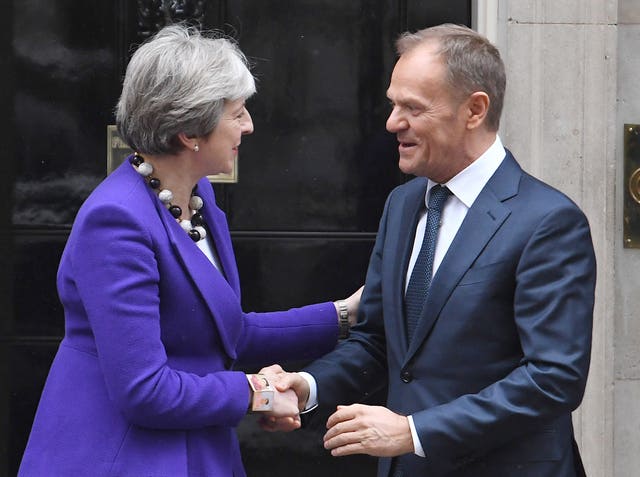
Britain is due to leave the European Union on Friday if an extension is not granted.
But how will events this week decide what happens?
– Tuesday April 9
Theresa May will head to Berlin and Paris for talks with German chancellor Angela Merkel and French president Emmanuel Macron.
READ MORE: Brexit: Conservatives on brink of meltdown as Theresa May heads to Brussels to plead for delay
The Prime Minister is expected to set out the rationale behind her request for a delay to the date of Brexit from April 12 to June 30.
The trip appears to make it unlikely that any compromise Brexit deal thrashed out with Labour will be put before MPs ahead of a crunch EU summit on Wednesday.
However, talks between the Government and Labour will continue.
READ MORE: Brexit: Theresa May to meet Angela Merkel and Emmanuel Macron in push for extension
And the Commons is to debate a Government motion setting June 30 as the requested Article 50 extension date.
The move means that MPs could seek to change the date of the requested extension via amendments.
ROYAL ASSENT: Having been agreed by both Houses of Parliament, the #EUWithdrawal5Bill has now received Royal Assent.
A motion under the terms of the European Union Withdrawal (No.5) Act 2019 – on the Article 50 extension to be requested from the EU – will be debated tomorrow. pic.twitter.com/70BH8UbMDP
— UK House of Commons (@HouseofCommons) April 8, 2019
– Wednesday April 10
The Prime Minister will head to Brussels on Wednesday afternoon for an emergency meeting of the European Council.
She will ask the leaders of the 27 remaining EU nations to grant her an extension to Article 50, without which the UK will leave with no-deal on Friday.
 Theresa May has written to Donald Tusk with the UK’s request for a further delay to Brexit )Victoria Jones/PA)
Theresa May has written to Donald Tusk with the UK’s request for a further delay to Brexit )Victoria Jones/PA)
– Thursday April 11
Mrs May is likely to outline plans in the wake of the EU summit.
– Friday April 12
This is when the UK is scheduled to leave the EU after MPs repeatedly rejected the Prime Minister’s deal.
Mrs May has written to European Council president Donald Tusk asking for a further extension to June 30, but the EU27 will have to agree to it when they meet on Wednesday.
If they do not agree to an extension, Britain will leave without a deal at 11pm on Friday.



Why are you making commenting on The Herald only available to subscribers?
It should have been a safe space for informed debate, somewhere for readers to discuss issues around the biggest stories of the day, but all too often the below the line comments on most websites have become bogged down by off-topic discussions and abuse.
heraldscotland.com is tackling this problem by allowing only subscribers to comment.
We are doing this to improve the experience for our loyal readers and we believe it will reduce the ability of trolls and troublemakers, who occasionally find their way onto our site, to abuse our journalists and readers. We also hope it will help the comments section fulfil its promise as a part of Scotland's conversation with itself.
We are lucky at The Herald. We are read by an informed, educated readership who can add their knowledge and insights to our stories.
That is invaluable.
We are making the subscriber-only change to support our valued readers, who tell us they don't want the site cluttered up with irrelevant comments, untruths and abuse.
In the past, the journalist’s job was to collect and distribute information to the audience. Technology means that readers can shape a discussion. We look forward to hearing from you on heraldscotland.com
Comments & Moderation
Readers’ comments: You are personally liable for the content of any comments you upload to this website, so please act responsibly. We do not pre-moderate or monitor readers’ comments appearing on our websites, but we do post-moderate in response to complaints we receive or otherwise when a potential problem comes to our attention. You can make a complaint by using the ‘report this post’ link . We may then apply our discretion under the user terms to amend or delete comments.
Post moderation is undertaken full-time 9am-6pm on weekdays, and on a part-time basis outwith those hours.
Read the rules here